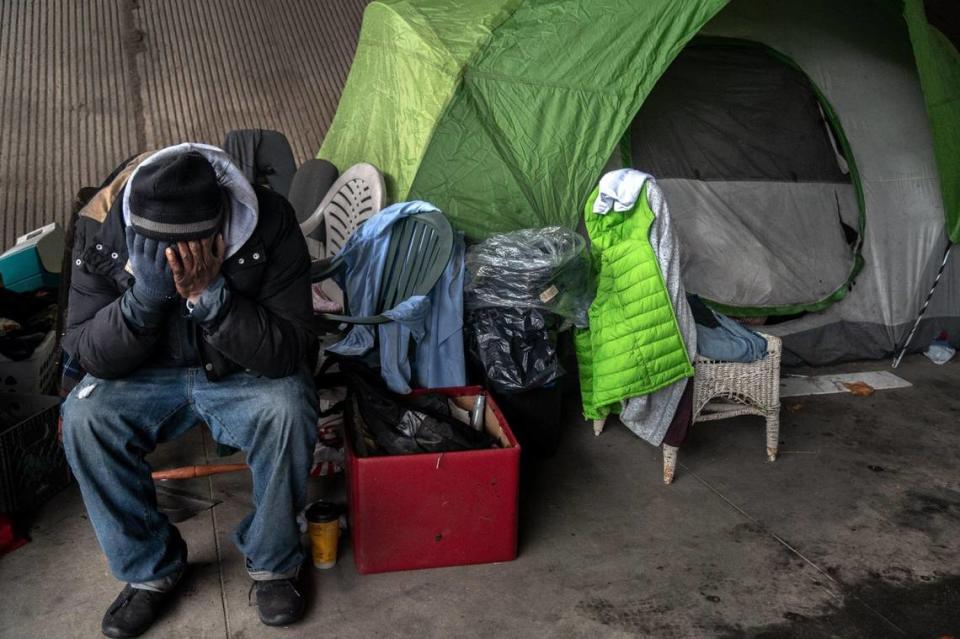‘Stay awake or be arrested’: Local governments must resist SCOTUS’ homelessness ruling | Opinion
Nothing in the Supreme Court’s decision in City of Grant’s Pass v. Johnson keeps cities from having humane and effective policies concerning the unhoused. In a terribly wrong decision from June 28, the court held that cities may enforce anti-camping ordinances, including criminal laws, against homeless individuals. The ruling does not require that cities do so, however, and hopefully local governments will be far more compassionate than the Supreme Court.
Grants Pass, Oregon has a population of about 39,000 and a homeless population of around 600. It does not have nearly that many shelter beds. Grants Pass adopted a series of ordinances meant to keep unhoused individuals from sleeping on public property, even going so far as to prohibit having a blanket, a piece of cardboard or a pillow for sleeping in public.
The U.S. Court of Appeals for the Ninth Circuit declared this unconstitutional, concluding that “Grants Pass cannot, consistent with the Eighth Amendment, enforce its anti-camping ordinances against homeless persons for the mere act of sleeping outside with rudimentary protection from the elements, or for sleeping in their car at night, when there is no other place in the city for them to go.”
Opinion
Yet, the Supreme Court, in a 6-3 decision split along ideological lines, reversed the Ninth Circuit’s decision.
In an opinion written by Justice Neil Gorsuch, the court held that cities may use anti-camping ordinances against the unhoused without violating the Constitution. In other words: A city can make it a crime for a person to sleep in public, even if there is nowhere else for the individual to sleep.
But everyone must sleep. In both this case and in an earlier ruling in 2018’s Martin v. City of Boise, the Ninth Circuit held that it is cruel and unusual punishment to impose criminal penalties on a person for sleeping in public if there are not adequate shelter beds.
Justice Sonia Sotomayor, in a dissent of the Grants Pass ruling, joined by Justices Elena Kagan and Ketanji Brown Jackson, agreed with the Ninth Circuit: “It is possible to acknowledge and balance the issues facing local governments, the humanity and dignity of homeless people, and our constitutional principles. Instead, the majority focuses almost exclusively on the needs of local governments and leaves the most vulnerable in our society with an impossible choice: Either stay awake or be arrested.”
Although the court held that there is no constitutional limit on the ability of cities to use their criminal laws against the unhoused, that does not mean that cities are compelled to do so. Instead, cities can and should follow the wisdom of the Ninth Circuit and Justice Sotomayor and not make sleeping in public a crime, nor should they enforce criminal laws against the unhoused where there is no place else for a person to sleep.
The criminal law is a terrible way to deal with the problem of homelessness. No city is going to solve homelessness by criminally prosecuting the unhoused. Imposing fines that they cannot pay or temporarily putting them in jail is not going to take them off the street.
Instead, policies like more low-cost housing and shelter beds have proven effective. Sacramento, under the leadership of Mayor Darrell Steinberg, has reported a 41% decrease in unsheltered homelessness since 2022. The city did this by increasing temporary housing capacity by 84% and permanent housing slots by 29%.
Los Angeles Mayor Karen Bass has also made decreasing homeless a top priority, and she is succeeding: In 2024, homelessness decreased in Los Angeles for the first time in six years. The overall number of people experiencing homelessness decreased by 2.2%, while the number of unsheltered people in the city (homeless people who are not in emergency shelter and are sleeping on the street, in tents or in cars) decreased by 10.4%.
Moreover, the Supreme Court’s decision does not preclude the California Supreme Court from finding that it’s a violation of the state constitution to criminally punish a person for sleeping in public when there is nowhere else for the person to sleep. The California legislature and city councils could also adopt sensible, humane policies.
Solving the problem of homelessness is difficult and expensive. But putting people in jail for sleeping in public does absolutely nothing to solve homelessness or help people in need.
Sotomayor concluded her dissent by observing: “I remain hopeful that our society will come together to address the complexities of the homelessness challenge facing the most vulnerable among us.” I share this hope.
Erwin Chemerinsky is dean and professor of law at the UC Berkeley School of Law.


